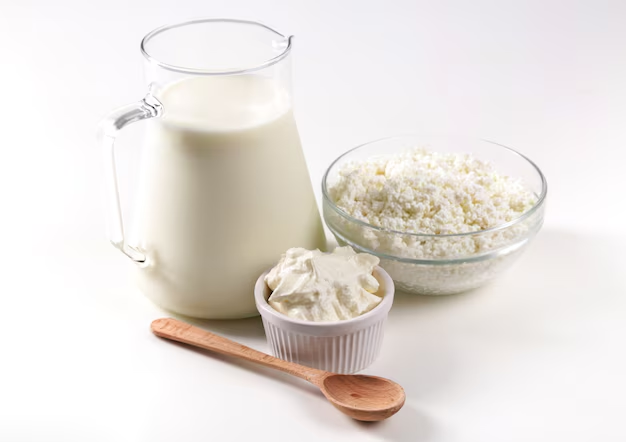Kefir has gained significant attention in the health and wellness world, and for good reason. But the question remains—is kefir healthy? This tangy, fermented drink, often compared to yogurt, boasts a robust nutritional profile and a myriad of health benefits. Its popularity stems from its rich probiotic content, which promotes gut health and overall well-being. Kefir is available in various forms, from milk kefir to water kefir, each offering unique benefits. Packed with protein, calcium, and essential vitamins, kefir is a powerful addition to any diet. Let’s explore why this fermented powerhouse is gaining momentum as a staple in health-conscious households.
What Is Kefir?
Kefir is a fermented beverage made by culturing milk or water with kefir grains. These grains are a combination of bacteria and yeast that transform the liquid into a probiotic-rich drink.
Types of Kefir
- Milk Kefir: Made from cow, goat, or sheep milk, it has a creamy texture and tangy taste. It’s rich in protein and calcium.
- Water Kefir: Made using water, sugar, and kefir grains, it offers a lighter, slightly fizzy option. It’s ideal for those avoiding dairy.
Both types provide gut-friendly probiotics, but their nutrient profiles differ. Milk kefir is protein-packed, while water kefir caters to those seeking a vegan-friendly option.
Nutritional Profile of Kefir
Kefir stands out as a nutrient-dense food, offering an impressive mix of macronutrients, micronutrients, and probiotics.
Macronutrients
A typical serving of milk kefir (1 cup or 240 ml) contains:
- Calories: Around 100–150, depending on the milk used.
- Protein: 6–8 grams, supporting muscle repair and growth.
- Carbs: 7–12 grams, primarily from natural lactose.
- Fat: 2–6 grams, depending on fat content (low-fat vs. full-fat versions).
Micronutrients
Kefir is a rich source of:
- Calcium: Essential for strong bones and teeth.
- Vitamin D: Supports bone health and immune function.
- B Vitamins: Such as B12 and riboflavin, which boost energy metabolism.
- Magnesium: Important for muscle and nerve function.
Probiotics and Their Role
Kefir is teeming with live probiotics, such as Lactobacillus and Bifidobacterium strains. These beneficial bacteria:
- Aid digestion.
- Enhance nutrient absorption.
- Strengthen the gut lining.
Health Benefits of Kefir
Kefir and Gut Health
Probiotics in kefir play a critical role in maintaining a healthy gut microbiome. They:
- Promote digestion by breaking down complex nutrients.
- Relieve symptoms of irritable bowel syndrome (IBS), such as bloating and gas.
- Combat harmful bacteria and prevent infections.
Regular consumption of kefir can create a balanced gut environment, essential for overall health.
Kefir for Immunity
Kefir is a potent immunity booster. Its probiotics and nutrients work together to strengthen your body’s defenses:
- Probiotics: Enhance the production of immune cells and reduce inflammation.
- Vitamins: Vitamin D and B12 support the immune response, making it easier to fight off infections.
Incorporating kefir into your daily routine can provide long-term immunity benefits.
Kefir and Bone Health
Bone health relies on key nutrients, and kefir delivers them in abundance:
- Calcium: Vital for bone density.
- Vitamin D: Helps the body absorb calcium effectively.
- Phosphorus: Supports the structural integrity of bones.
These nutrients collectively make kefir a powerful ally against osteoporosis and bone fractures.
Kefir for Weight Management
Kefir can aid in weight management by:
- Keeping you full due to its protein content, which curbs overeating.
- Supporting metabolism through probiotics, which optimize digestion and nutrient usage.
Whether your goal is weight loss or maintenance, kefir fits seamlessly into a balanced diet.
Kefir and Skin Health
Gut health and skin health are deeply connected, a phenomenon known as the gut-skin axis. Kefir’s probiotics:
- Reduce skin inflammation and conditions like acne.
- Support the repair of the skin barrier, enhancing hydration.
By improving gut health, kefir indirectly contributes to clearer, healthier skin.
Kefir and Heart Health
Kefir can play a role in promoting cardiovascular health through several mechanisms:
- Cholesterol Reduction: Probiotics in kefir may help reduce LDL (bad cholesterol) levels while increasing HDL (good cholesterol).
- Blood Pressure Regulation: Kefir contains bioactive peptides that can help relax blood vessels and improve circulation.
- Anti-inflammatory Effects: Chronic inflammation is a key contributor to heart disease. Kefir’s probiotics and antioxidants help reduce inflammation in the body.
Incorporating kefir into your diet can be a step towards maintaining a healthy heart.
Related to Read: Is Yogurt Good for Acid Reflux? A Complete Guide
How to Add Kefir to Your Diet
Adding kefir to your daily routine is simple and versatile. Here are some easy ways to enjoy it:

Drink It Plain
Kefir can be consumed on its own as a refreshing drink. Choose between plain or flavored options, but opt for unsweetened varieties for maximum health benefits.
Blend It in Smoothies
Kefir makes a creamy base for smoothies. Combine it with fruits, greens, and a touch of honey for a nutritious treat.
Use It in Recipes
- Salad Dressings: Replace mayonnaise or sour cream with kefir for a tangy twist.
- Baking: Use kefir instead of buttermilk in pancakes, muffins, or bread.
- Soups: Stir kefir into chilled soups like gazpacho for added creaminess.
Who Should Avoid Kefir?
While kefir offers numerous health benefits, it may not be suitable for everyone:
- Lactose Intolerance: Though kefir has less lactose than regular milk, some individuals may still experience discomfort.
- Allergies: Those allergic to dairy or yeast should avoid milk kefir.
- High Sugar Content: Some flavored kefir products contain added sugars, which can counteract the health benefits.
Always consult with a healthcare professional before making significant dietary changes.
How to Choose the Right Kefir
Selecting the right kefir product is crucial for reaping its benefits. Keep these tips in mind:
- Check Labels: Look for unsweetened, organic options with live and active cultures.
- Examine Ingredients: Avoid products with added sugars, artificial flavors, or preservatives.
- Milk vs. Water Kefir: Choose based on your dietary preferences and needs (e.g., vegan or lactose-free).
Homemade kefir is also an option for those who prefer full control over the ingredients.
Potential Side Effects of Kefir
While kefir is a health-promoting beverage, it may not suit everyone. Understanding its potential side effects can help you consume it wisely.
Lactose Intolerance Considerations
Kefir contains less lactose than milk due to fermentation, making it easier to digest for many. However, individuals with severe lactose intolerance might still experience discomfort such as bloating or gas. For these cases:
- Opt for water kefir, which is entirely lactose-free.
- Start with small amounts to assess tolerance.
Overconsumption and Digestive Issues
Drinking excessive amounts of kefir can lead to temporary digestive discomfort, including:
- Diarrhea: High probiotic content may overwhelm your gut.
- Bloating: Especially for those new to fermented foods.
It’s best to start with a half-cup per day and gradually increase as your body adjusts.
Allergies or Sensitivities
Kefir contains yeast and dairy, which can trigger allergic reactions in sensitive individuals. Symptoms to watch for include:
- Itching or swelling.
- Stomach upset.
- Breathing difficulties in severe cases.
Consult a healthcare provider if you suspect an allergy.
How to Incorporate Kefir Into Your Diet
Adding kefir to your routine is simple and versatile. Whether you’re a first-timer or an experienced enthusiast, here’s how to make the most of it.

Best Ways to Consume Kefir
- As a Standalone Drink: Sip plain kefir as a refreshing, nutritious beverage.
- In Smoothies: Blend kefir with fruits, spinach, and a drizzle of honey for a creamy smoothie.
- Breakfast Bowls: Pour kefir over granola or oats, topped with fresh fruits and nuts.
Tips for First-Time Kefir Drinkers
- Start Small: Begin with a half-cup to avoid digestive discomfort.
- Choose Unsweetened Varieties: They offer maximum health benefits without added sugar.
- Experiment: Try flavored options if plain kefir is too tangy for your taste.
Creative Recipes Using Kefir
- Salad Dressing: Mix kefir with olive oil, lemon juice, and herbs.
- Baked Goods: Use kefir as a substitute for buttermilk in pancakes or muffins.
- Chilled Soups: Add kefir to cold soups like cucumber or beet gazpacho for a creamy texture.
Kefir vs. Other Fermented Foods
How does kefir compare to other popular fermented foods like yogurt and kombucha? Let’s dive into the details.
Kefir vs. Yogurt
- Probiotic Content: Kefir contains a broader range of probiotics, including yeast strains.
- Texture: Kefir is thinner and drinkable, while yogurt is spoonable.
- Lactose Digestion: Kefir is more suitable for individuals with mild lactose intolerance.
Kefir vs. Kombucha
- Base Ingredient: Kefir is dairy- or water-based, while kombucha is made from tea and sugar.
- Probiotic Variety: Kefir offers more diverse probiotics compared to kombucha.
- Taste: Kombucha is fizzy and tangy, while kefir is creamy or lightly fizzy (in the case of water kefir).
Key Nutritional Differences
| Feature | Kefir | Yogurt | Kombucha |
| Probiotics | High variety | Moderate | Moderate |
| Protein | High (milk kefir) | High | Low |
| Sugar Content | Varies (unsweetened preferred) | Low (plain yogurt) | Moderate |
Frequently Asked Questions (FAQs)
1. Is Kefir Good for You Every Day?
Yes, you can drink kefir daily. Regular consumption promotes gut health, boosts immunity, and supports digestion. If you’re new to kefir, start with small portions and gradually increase to avoid potential side effects.
2. Can You Drink Kefir if You’re Lactose Intolerant?
Many people with lactose intolerance can tolerate kefir due to its low lactose content. Fermentation breaks down most of the lactose, making it easier to digest. Alternatively, opt for water kefir if you’re highly sensitive.
3. What’s the Best Time to Drink Kefir?
The best time to drink kefir is:
- Morning: To start your day with probiotics and energy.
- After Meals: Aids digestion and nutrient absorption.
Experiment with timing to find what works best for your body.
4. Is Store-Bought Kefir as Healthy as Homemade?
Both options are nutritious, but homemade kefir allows you to control ingredients and avoid added sugars or preservatives. Store-bought kefir is convenient but choose unsweetened varieties with live cultures for maximum benefits.
5. Does Kefir Help with Bloating or Gas?
Yes, kefir can alleviate bloating and gas by promoting a healthy gut microbiome. However, overconsumption or intolerance can lead to temporary discomfort.
Conclusion
So, is kefir healthy? Absolutely. With its impressive nutritional profile, rich probiotic content, and numerous health benefits, kefir is a versatile superfood that can enhance gut health, immunity, weight management, and more. Whether you prefer the creaminess of milk kefir or the lightness of water kefir, this fermented drink can easily fit into your daily routine. Start small, explore recipes, and discover the positive changes kefir can bring to your health journey.

